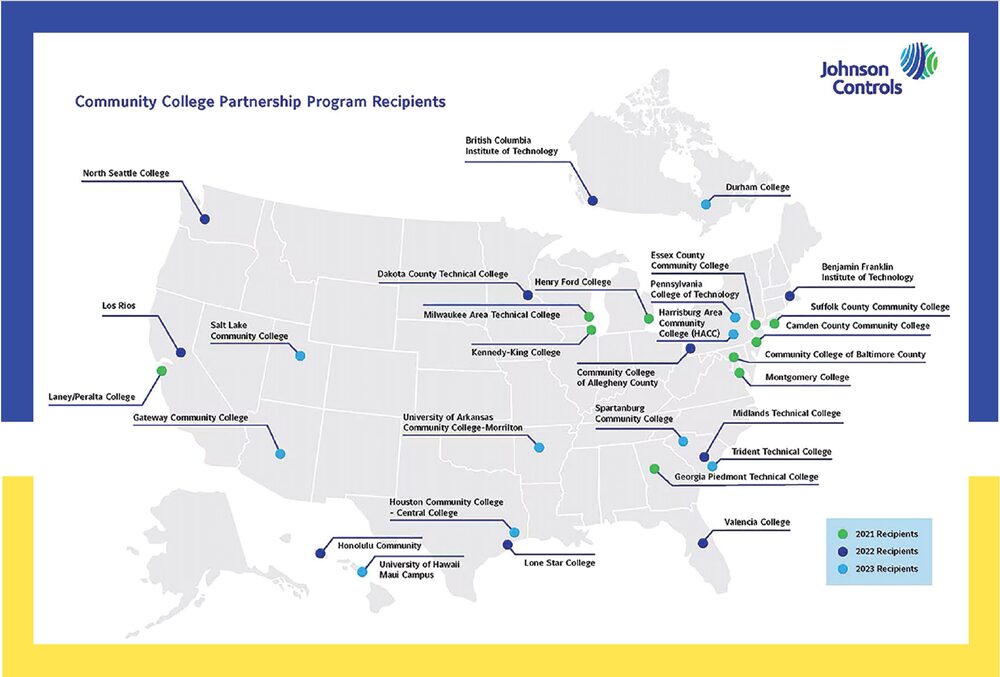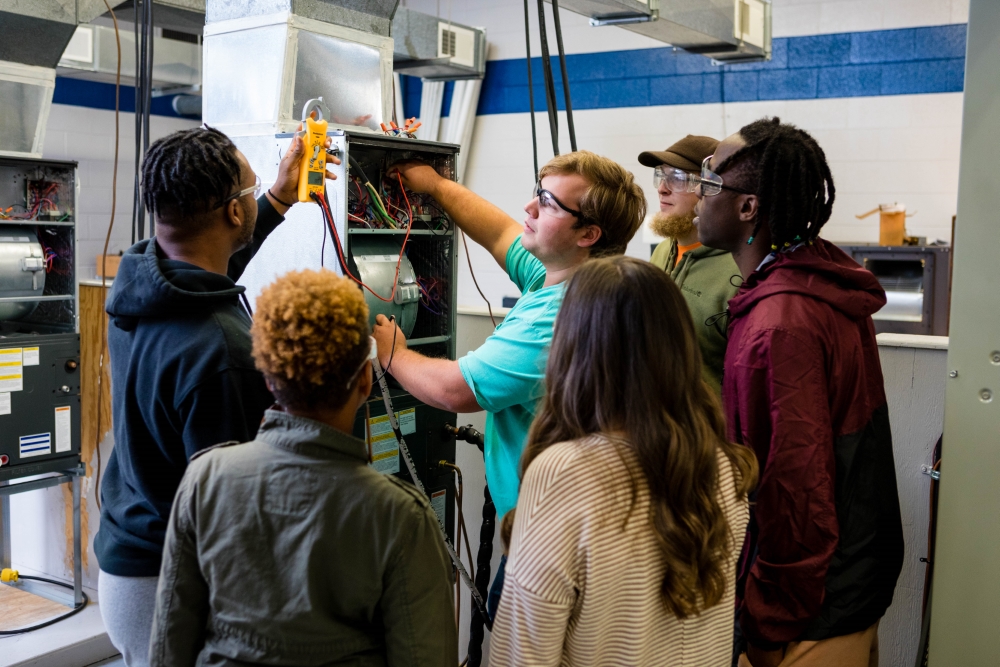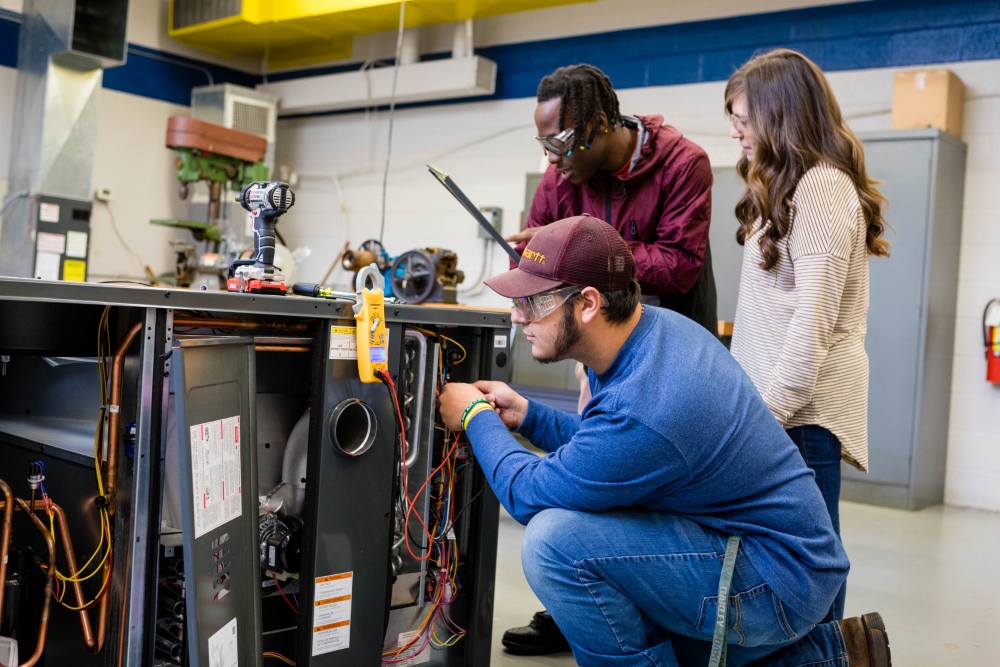As the world looks to building a more sustainable future, talent found at community colleges play a crucial role in pioneering environmentally conscious innovation.
For building technology, software and services company Johnson Controls, investing in community colleges around the U.S. has become a key strategy for the future of the company.
About 40% of the world’s greenhouse gasses come from the construction and operations of facilities catered to any industry, making the development of the company’s Community College Partnership Program a natural fit to engage students in sustainable building practices.
“What better way to put our money where our mouth is to build the trades?” says Johnson Controls Human Resources Vice President Mike Schade. “To be able to create jobs for individuals who are going to make buildings run more efficiently, particularly on the HVAC and control side, but certainly in fire detection and security as well.”
Constructing a Career Pathway
The program first launched in 2021, with a goal of investing $15 million into academic programming at non-profit community colleges by 2026. The grant funding creates an avenue for schools to submit detailed proposals catered to expand heating, ventilation and air conditioning (HVAC), fire, security and building automation systems degree and certificate programs in regions where Johnson Controls has a strong customer and employee presence.

Courtesy of Johnson Controls
In many cases it pinpoints lower income and underserved markets, which hold a highly diverse talent pool.
The initial cohort of 10 community colleges were provided $100,000 in grant funding, renewable for up to three years. This first round included Camden County College, the Community College of Baltimore, Essex County College, Georgia Piedmont Technical College, Henry Ford Community College, Kennedy King College, Lone Star College, Milwaukee Area Technical College, Montgomery College and Suffolk College — who were able to use their grant based on urgent needs such as purchasing and developing classroom materials, equipment, scholarships and more.
As of 2024, the program has pulled together a network of 30 colleges around the nation located within proximity of the company’s U.S. operations. The initiative is an all-hands-on-deck approach, as the company’s employees can volunteer as educators or student mentors throughout the process.
Schade states the program works in two ways. The first is by investing in Johnson Controls’ local leadership teams to build the future of local operations, where senior professionals and technicians can gain skills to move up to management roles. The second: Existing employees are able to heavily engage with fresh talent and provide first-hand experiences that impact students moving through the program and into new career opportunities.
“I think our employees and our teams that engage with the local community colleges feel better about our company and are more productive as a result,” says Schade.
This concept is not new for Johnson Controls, whose philanthropic activities have led local teams to invest in every level of education, touching grade school and high school levels. In particular, the Community College Partnership Program comes as a formulation of past initiatives such as the company’s partnership with Lincoln Educational Services Corporation, which has resulted in over 500 job placements for skilled building trade graduates since 2018. The duo has cultivated two JCI Academy locations in Columbia, Maryland, and Denver, Colorado, providing a six-week intensive training program for newly hired technicians that leads directly to roles at various Johnson Controls operations around the nation.

Photo courtesy of Spartanburg Community College
The Community College Partnership Program works differently, as it aims to support colleges in starting up or advancing their building technology programs, so students participating in the program are not available for direct hire initially. Schade says so far the program has led to about 100 students being hired, a number the company plans to dramatically improve moving forward. That said, in combination with talent coming out of JCI Academies powered by Lincoln Tech, Johnson Controls gathers around 25% of its technician hiring needs through these two channels.
“We know our objective is to certainly benefit Johnson Controls customers,” says Schade. “But really, we’re also making sure we’re investing in the future of the industry. The more ability to know more about technology through data, analytics and AI that helps our technicians support our customers, the better.”
Program Success
Georgia Piedmont Technical College’s (GPTC) Clarkston campus was one of the first colleges welcomed to the program’s initial cohort for the 2021-22 school year. To date, the college has received almost $300,000 in funding to grow its Building Automation Systems (BAS) program through the School of Industrial Technologies.
“Without this partnership, it would have been challenging to secure the necessary resources to offer such comprehensive training,” says GPTC BAS Director Justin Haynes. “The funding not only facilitated the acquisition of advanced training equipment but also likely supported curriculum development and other educational initiatives, making the program more robust and effective.”
Johnson Controls’ support allowed GPTC to incorporate modern lab equipment on-site while boosting the college’s commercial refrigeration and welding education curriculum working alongside the company’s employees. The result? Such activity has spurred new internship and networking opportunities.
Haynes, who has served as director for almost two years, says that community recruitment through career fairs, pep rallies, news outlets, after-school robotics programs and volunteer work with local church STEM programs has been a key route in addressing technician workforce shortages faced in Georgia.
“When I started teaching, I had only about six students in my class,” notes Haynes. “Now, as the word has spread about the great BAS program at GPTC, more young men and women are showing high interest in joining the program as soon as they can. I am expecting a full class of 15 students by 2026.”
Newly acquired desktop trainers allow current students to gain comprehensive understanding of the field, as they can explore more than 200 lessons on building automation techniques and circuits. Aside from technical training supported by Johnson Controls, GPTC continues to collaborate with local businesses to introduce new internship and real-world project experiences to students building their practical skill sets.
“One of the most exciting developments is the ‘Living Lab’ which uses controllers provided by Johnson Controls to monitor the lighting, occupancy, humidity, energy usage and temperature of each room in the building where our students study, as well as some HVAC units,” says Haynes. “This setup provides real-world scenarios, allowing students to apply both soft and hard skills they learn in class.”
The arrival of the Community College Partnership Program to GPTC was a welcomed catalyst to boost interest in the BAS industry in Georgia, as the state continues to recover from COVID-19 pandemic-related job losses and the evolving industry’s needed skillsets. The ability to learn alongside a company like Johnson Controls is in line with the college’s goal of strengthening industry partnerships that work to enhance student learning and increase GPTC’s BAS programming visibility and reputation.
“Overall, the program is thriving, and we are excited about the future as we continue to grow and innovate,” says Haynes.
Spartanburg Community College (SCC), located in Spartanburg, South Carolina, is part of the latest 2023-24 cohort. The $100,000 initial grant funding the college received has allowed SCC to introduce tools and practices that have been previously out of reach for students.
SCC’s School of Industrial Technologies Dean Tony Chadwick says that Johnson Controls’ program will be a gamechanger for students who get to not only work with new technologies but learn hands-on alongside a top-tier employer.
“This isn’t just about new, state-of-the-art equipment,” he says. “It’s about unlocking real, tangible opportunities, ensuring our students are job-ready on day one, which, in turn, sets them up for success in today’s competitive workforce.”
The college’s HVAC programming has continuously been one of the most popular degrees pursued by students in the region, running at full capacity year after year. Chadwick says the program works to “not only fill seats, but also fuel careers,” as many students are already employed in the industry and will allow SCC to meet growing needs of employers head-on.
“This mentorship from Johnson Controls opens doors to invaluable, real-world insights for our students,” says Chadwick. “Together, we can continue to work to bridge classroom learning with workforce expectations, empowering our students to step confidently into their careers and boosting opportunity across our entire region.”
Currently, new activity has introduced cutting-edge controllers and the latest technology students will encounter in real-world settings. These tools have led SCC to be ready to update its curriculum to keep pace with new emerging technologies and ensure graduates are prepared to immediately move into the job market.

